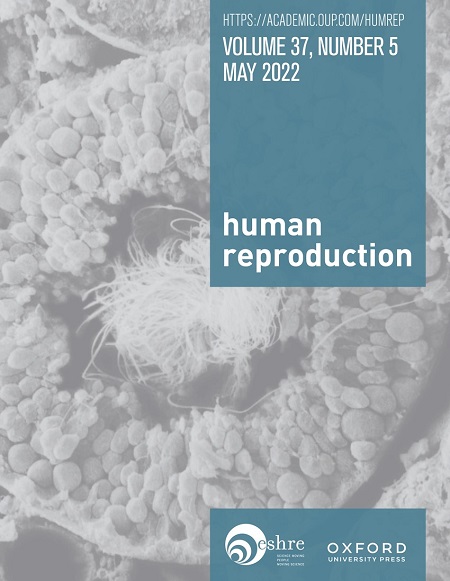No anxiety or pain reduction by Virtual Reality during oocyte retrieval in IVF/ICSI treatment: results of a randomized controlled trial.
IF 6.1
1区 医学
Q1 OBSTETRICS & GYNECOLOGY
引用次数: 0
Abstract
STUDY QUESTION What is the effect of Virtual Reality (VR) on anxiety and pain during oocyte retrieval in IVF/ICSI treatment? SUMMARY ANSWER There is no significant effect of VR on anxiety and pain during oocyte retrieval in IVF/ICSI treatment. WHAT IS KNOWN ALREADY Patients undergoing oocyte retrieval in IVF/ICSI treatment often experience anxiety and pain, despite conscious sedation. VR might offer a solution since it has been successful in reducing procedural anxiety and pain during medical procedures, with the potential to replace standard analgesic care. STUDY DESIGN, SIZE, DURATION A single-centre, open-label, randomized controlled trial was conducted between February 2023 and August 2024. Due to the nature of the intervention, the study was not blinded. PARTICIPANTS/MATERIALS, SETTING, METHODS Patients undergoing oocyte retrieval as part of IVF/ICSI treatment were screened. After providing informed consent, participants were randomized between oocyte retrieval with VR added to conscious sedation and oocyte retrieval with conscious sedation only. When assigned to the intervention group, patients received the VR intervention through a head-mounted device, showing nature films and relaxation exercises. This was added to standard care which includes analgesia and sedatives. Sounds were delivered through the head-mounted device or headphones. The primary outcome was pre- and post-procedural anxiety, measured using the STAI questionnaire. Secondary outcomes included procedural pain (NRS, scale 0-10), satisfaction scores (NRS, scale 0-10), VR preferences, and side effects. MAIN RESULTS AND THE ROLE OF CHANCE There were 113 participants included: 57 in the intervention group receiving VR and 56 in the control group not receiving VR. We observed no differences between the intervention and control groups in pre-procedural anxiety (mean difference (MD) 0.14 (95% CI -1.78, 2.05), P = 0.885), post-procedural anxiety (MD 0.45 (95% CI -1.21, 2.11), P = 0.589), overall pain (MD -0.12 (95% CI -0.97, 0.73), P = 0.779), and peak pain (MD 0.59 (-0.51, 1.68), P = 0.287). LIMITATIONS, REASONS FOR CAUTION VR might only be effective for a certain group of patients undergoing retrieval, or might be more effective in reducing pre-procedural anxiety, which in turn might lead to a reduction in procedural pain. Furthermore, it might reduce pain up to a certain threshold, or be effective when the duration of the procedure is short. WIDER IMPLICATIONS OF THE FINDINGS Since VR does not affect anxiety and pain for the general patient population undergoing oocyte retrieval, we do not advise incorporating VR to standard IVF/ICSI anxiety and pain management. For future studies, it is important to investigate which subgroup could benefit from VR and how it could be implemented to study interventions from a non-pharmacological approach. Patient preferences regarding anxiety and pain management during IVF/ICSI treatment should be considered. STUDY FUNDING/COMPETING INTEREST(S) External funding from ZonMw (Grant number 838002978), the Implementation and Scale-up Coaching, and the Eggcelent Change grant from Theramex have been received for this study to cover the costs of the VR devices. A.P.v.H. and K.R. report to have received a travel grant from Merck to visit ESHRE 2022. A.M.F.S. reports to have been an invited speaker at ESHRE where travel and hotel costs are covered. V.M. reports to have received institutional research grants from Guerbet, Merck, and Ferring. He has received travel and speaker's fees from Guerbet. J.W.K. reports to be on the Advisory board of Boston Scientific, Saluda, Nevro, Abbott, and Medtronic, and received consulting fees from these organizations. He is a board member of the BNS. KD reports to have received an institutional research grant from Guerbet, a speaker's fee from Guerbet, and financial support to attend meetings by Merck and Guerbet. TRIAL REGISTRATION NUMBER NCT05555498. TRIAL REGISTRATION DATE 26 September 2022. DATE OF FIRST PATIENT’S ENROLMENT 7 February 2023.在IVF/ICSI治疗的卵母细胞提取过程中,虚拟现实没有减轻焦虑或疼痛:一项随机对照试验的结果。
研究问题:在IVF/ICSI治疗中,虚拟现实(VR)对卵母细胞提取过程中的焦虑和疼痛有什么影响?结论:在IVF/ICSI治疗中,VR对取卵过程中的焦虑和疼痛无显著影响。已知情况:在体外受精/ICSI治疗中接受卵母细胞提取的患者,尽管有清醒的镇静,但通常会感到焦虑和疼痛。虚拟现实可能会提供一个解决方案,因为它已经成功地减少了医疗过程中的程序焦虑和疼痛,有可能取代标准的镇痛治疗。研究设计、规模、持续时间一项单中心、开放标签、随机对照试验于2023年2月至2024年8月进行。由于干预的性质,该研究没有采用盲法。参与者/材料,环境,方法接受卵母细胞回收作为IVF/ICSI治疗的一部分的患者进行筛选。在提供知情同意后,参与者被随机分为两组,一组是在有意识镇静的情况下使用VR取回卵母细胞,另一组是只使用有意识镇静取回卵母细胞。当被分配到干预组时,患者通过头戴式设备接受VR干预,播放自然电影和放松练习。这是添加到标准护理,包括镇痛和镇静剂。声音通过头戴式设备或耳机传递。主要结果是手术前和手术后的焦虑,使用STAI问卷进行测量。次要结局包括程序性疼痛(NRS,量表0-10)、满意度评分(NRS,量表0-10)、VR偏好和副作用。主要结果和机会的作用纳入113名参与者:57名干预组接受虚拟现实,56名对照组未接受虚拟现实。我们观察到干预组和对照组在手术前焦虑(平均差异(MD) 0.14 (95% CI -1.78, 2.05), P = 0.885),手术后焦虑(MD 0.45 (95% CI -1.21, 2.11), P = 0.589),总体疼痛(MD -0.12 (95% CI -0.97, 0.73), P = 0.779)和峰值疼痛(MD 0.59 (-0.51, 1.68), P = 0.287)方面没有差异。局限性:注意的原因:vr可能只对某一组接受取出术的患者有效,或者可能在减少手术前焦虑方面更有效,这反过来可能导致手术疼痛的减少。此外,它可以将疼痛减轻到一定程度,或者在手术持续时间短的情况下有效。由于VR不会影响接受卵母细胞提取的一般患者群体的焦虑和疼痛,我们不建议将VR纳入标准的IVF/ICSI焦虑和疼痛管理。对于未来的研究,重要的是调查哪个亚组可以从VR中受益,以及如何通过非药物方法实施研究干预措施。应考虑试管婴儿/ICSI治疗期间患者对焦虑和疼痛管理的偏好。研究资金/竞争利益(S)本研究已收到来自ZonMw的外部资金(资助号838002978)、实施和扩大培训以及Theramex的Eggcelent Change赠款,用于支付VR设备的费用。据报道,A.P.v.H.和K.R.已获得默克公司的旅行资助,前往ESHRE 2022。据报道,A.M.F.S.曾受邀在ESHRE发表演讲,ESHRE的差旅和酒店费用由该机构承担。据报道,V.M.已经获得了来自Guerbet, Merck和ferling的机构研究资助。他从格贝特那里获得了旅费和演讲费。J.W.K.是波士顿科学公司、Saluda、negro、Abbott和Medtronic公司的顾问委员会成员,并从这些组织获得咨询费。他是BNS的董事会成员。据报道,KD已经获得了来自Guerbet的机构研究资助,来自Guerbet的演讲费,以及参加默克和Guerbet会议的财政支持。试验注册号05555498。试验注册日期为2022年9月26日。第一个患者入组日期2023年2月7日。
本文章由计算机程序翻译,如有差异,请以英文原文为准。
求助全文
约1分钟内获得全文
求助全文
来源期刊

Human reproduction
医学-妇产科学
CiteScore
10.90
自引率
6.60%
发文量
1369
审稿时长
1 months
期刊介绍:
Human Reproduction features full-length, peer-reviewed papers reporting original research, concise clinical case reports, as well as opinions and debates on topical issues.
Papers published cover the clinical science and medical aspects of reproductive physiology, pathology and endocrinology; including andrology, gonad function, gametogenesis, fertilization, embryo development, implantation, early pregnancy, genetics, genetic diagnosis, oncology, infectious disease, surgery, contraception, infertility treatment, psychology, ethics and social issues.
 求助内容:
求助内容: 应助结果提醒方式:
应助结果提醒方式:


